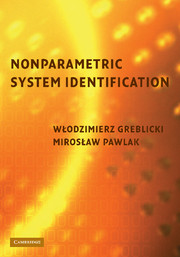Book contents
- Frontmatter
- Contents
- Dedication
- Preface
- 1 Introduction
- 2 Discrete-time Hammerstein systems
- 3 Kernel algorithms
- 4 Semirecursive kernel algorithms
- 5 Recursive kernel algorithms
- 6 Orthogonal series algorithms
- 7 Algorithms with ordered observations
- 8 Continuous-time Hammerstein systems
- 9 Discrete-time Wiener systems
- 10 Kernel and orthogonal series algorithms
- 11 Continuous-time Wiener system
- 12 Other block-oriented nonlinear systems
- 13 Multivariate nonlinear block-oriented systems
- 14 Semiparametric identification
- A Convolution and kernel functions
- B Orthogonal functions
- C Probability and statistics
- References
- Index
13 - Multivariate nonlinear block-oriented systems
Published online by Cambridge University Press: 06 November 2009
- Frontmatter
- Contents
- Dedication
- Preface
- 1 Introduction
- 2 Discrete-time Hammerstein systems
- 3 Kernel algorithms
- 4 Semirecursive kernel algorithms
- 5 Recursive kernel algorithms
- 6 Orthogonal series algorithms
- 7 Algorithms with ordered observations
- 8 Continuous-time Hammerstein systems
- 9 Discrete-time Wiener systems
- 10 Kernel and orthogonal series algorithms
- 11 Continuous-time Wiener system
- 12 Other block-oriented nonlinear systems
- 13 Multivariate nonlinear block-oriented systems
- 14 Semiparametric identification
- A Convolution and kernel functions
- B Orthogonal functions
- C Probability and statistics
- References
- Index
Summary
In all of the preceding chapters, we have examined the identification problem for block-oriented systems of various forms, that are characterized by a one-dimensional input process. In numerous applications, we confront the problem of identifying a system that has multiple inputs and multiple interconnecting signals. The theory and practical algorithms for identification of multivariate linear systems have been thoroughly examined in the literature [332]. On the other hand, the theory of identification of multivariate nonlinear systems has been far less explored. This is mainly due to the mathematical and computational difficulties appearing in multivariate problems. In this chapter, we examine some selected multivariate nonlinear models that are natural generalizations of the previously introduced block-oriented connections. An apparent curse of dimensionality that takes place in high-dimensional estimation problems forces us to focus on low-dimensional counterparts of the classical block-oriented structures. In particular, we examine a class of additive models, which provides a parsimonious representation for multivariate systems. Indeed, we show that the additive systems provide simple and interpretable structures, which also give a reasonable trade-off between the systematic modeling error and the estimation error of an identification algorithm. The theory of finding an optimal additive model is examined.
Multivariate nonparametric regression
As in all of the previous chapters, we will make use of the notion of a regression function.
Information
- Type
- Chapter
- Information
- Nonparametric System Identification , pp. 222 - 249Publisher: Cambridge University PressPrint publication year: 2008
